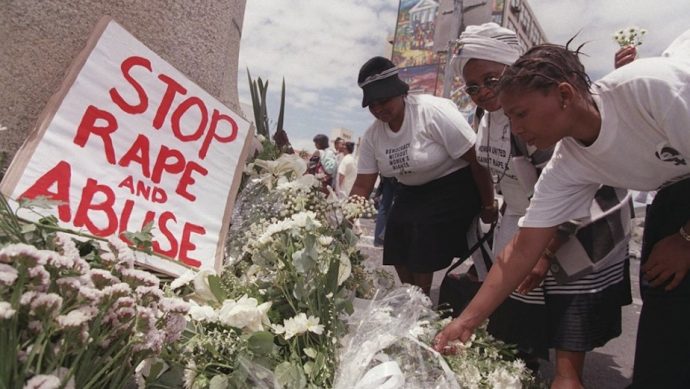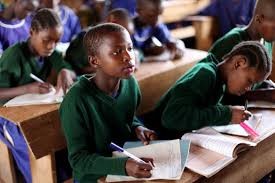“No amount of me trying to explain myself was doing any good. I didn’t even know what was going on inside of me, so how could I have explained it to them?” ― Sierra D. Waters, Debbie.
Also trending in Africa is the issue of rape. Rape has become so prevalent one might view it as a culture: a long-standing ‘way of life’, so prestigious to the predators, but damning to the prey. Rape is the unfortunate story of many women and young girls, that displays a very abusive aspect of the African culture. Most African communities have been accused of nurturing a rape culture for centuries under the guise of culture and tradition. A rape culture is viewed as a society in which rape is not only rampant, but also normalised, due to societal attitudes regarding gender and sexuality. Being in a highly patriarchal society, the obvious victims to such heinous crimes are young girls and women. In South Africa for instance, the ritual known as Ukuthwala in the Nguni community allows for a young man of marriageable age to kidnap a girl or a young woman with the intention of forcing her family to initiate negotiations and approve the marriage. Although similar practices were eventually banned in some local communities in Kenya, Rwanda and Ethiopia, the ban is not taken seriously and many men continue to carry out forced sexual intercourse with kidnapped brides.
Find out about African women in leadership positions
Back in 2009, a study conducted in the Eastern Cape and KwaZulu-Natal provinces in South Africa, using the model of one male interviewee under the age of 30 from all racial groups and socioeconomic backgrounds (rural and urban areas) revealed: of the 27.6% of men who had committed rape, 23.2% of men admitted to raping two to three women, 8.4% had raped four to five women, 7.1% said they had raped six to ten, and 7.7% said they had raped more than ten women or girls according to the report. Regarding the time frame when these acts were committed, 9.8% said they were under 10 years old, 16.4% were 10-14 years old, 46.5% were 15-19 years old, 18.6% were 20-24 years old, 6.9% were 25-29 years old, and 1.9% were 30 or older.
A research conducted by Sarah Brown confirmed more children are being raped in South Africa as opposed to women between the age of 26 and 45. Between 2015 and 2016, 15,790 cases of child rape were reported. Besides South Africa, Sierra Leone is currently battling with an increase in rape crimes leading to President Julius Maada Bio declaring rape and sexual violence a national emergency earlier this year. Police reports reveal there were over 8,500 reported cases of sexual- and gender-based violence in 2018 alone, with a third of these cases involving minors – 70% of all survivors are supposedly under the age of 15.
Meet Catherine Mahugu the creator of a virtual market place
Why do many rape cases go unreported?
Despite the gravity of the crime, many rape cases go unnoticed by authorities and even the immediate family members or friends of the victims for several reasons. First of all, the victims fear humiliation of being exposed as a victim of rape in a community which might eventually lead to isolation or abandonment. Situations like these are very common especially in cases where the offender is a member of the victim’s family or a family friend. There is equally a fear of retaliation or intimidation by the offender who might sometimes be supported by family members and peers. Most victims cannot afford to file legal charges against offenders or have access to services (medical or social welfare), because of financial handicaps. In case the victim is a child and relies on the offender income for survival, there are lesser chances of the case being reported given the fact that the victim is in a financially disadvantaged circumstance. Also, most victims do not want to extend the psychological trauma and pain to their loved ones, who already find themselves entangled in a web of poverty and hardship.
A failing criminal justice system
Despite the fact that statistics back in 2009 showed that 500,000 rapes were committed annually in South Africa, for every 25 men accused of rape, only one was convicted of the crime. According to Daniel Kettoh, executive director of Rainbo Center, of the 2,900 sexual violence cases that were reported to the centre in 2018, only 1.3% were successfully prosecuted. Kettoh further disclosed more than 3,000 cases are awaiting trial — moreover it sometimes takes years for a woman to get a hearing. The system’s inability to address the situation at a timely, fair and just manner is one of the major reasons why communities especially the victims have no faith in the system that eventually allows the rapists to go unpunished. Officials are often biased against survivors and treat them insensitively or inappropriately, causing secondary trauma. Also, the system is fragmented, lacking cohesive links between one service provider and another in the overall service chain – from the police services, to the forensic unit to the courtroom. Many cases fall between the loopholes and are lost or weakened as a result. In addition, the way the system is set up (predominantly male administrators) gives the accused more rights and greater levels of representation in court than the victim of the crime. This resulting culture of impunity has only assisted in reinforcing the number of rape incidents in many local communities, making it almost difficult for women and young girls to live freely within their communities and get the justice they deserve.
“So many years past being raped, I tell myself what happened is ‘in the past.’ This is only partly true. In too many ways, the past is still with me. The past is written on my body. I carry it every single day. The past sometimes feels like it might kill me. It is a very heavy burden.” ― Roxane Gay.





